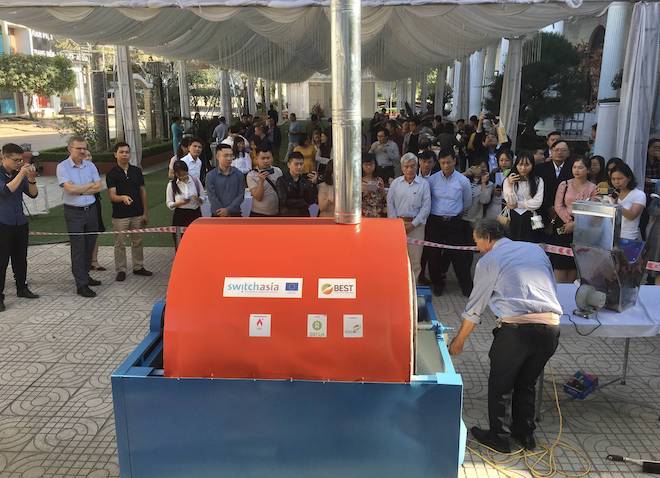
This story is published in collaboration with SWITCH-Asia.
Huge agricultural residues in Viet Nam are being treated as wastes, dumped, and burned, causing pollution and wasting resources. According to 2017 statistics from the Ministry of Industry and Trade, while Viet Nam's agriculture sector produced 118 million tons of agricultural biomass annually, only 11% is used.
For agri micro, small, and medium enterprises (MSEs), switching to a cleaner and cheaper source of energy has become urgent. A proper biomass-based energy technology, which could turn agricultural residues into fuel for heating and processing purposes, will not only meet this need, but also contribute to reducing rural pollution. Even though the government has policies in place to encourage investments in biomass energy, it has not achieved strong buy-in from investors due to the lack of affordable and practical biomass gasification technology and comprehensive solutions that will fully support the adoption of the technology and its expansion, while resolving the challenge of scattered dispersal of biomass sources in Viet Nam.
To respond to these needs and challenges, on 10 November 2020, the European Union-backed SWITCH-Asia project, Biomass Gasification Technology - Sustainable Energy Solution for Agri-Food Processing and Waste Management in Rural Areas of Vietnam (BEST), was launched in the Thai Nguyen province, one of the project areas and home to tea plantations in Viet Nam.
Around 100 participants, including local leaders, SMEs, households, enterprises, international organizations, Ministry of Planning and Investment representatives, and media joined the event and engaged in interactive discussions on the project’s feasibility, its contribution to economic, social, and environmental development, especially green development and sustainable agriculture production.
Koen Duchateau, head of cooperation of the EU Delegation to Viet Nam, opened the event and highlighted the unique opportunity the country has to promote a systemic approach of the agri-food sector by engaging with all stakeholders along its value chain as well as with policymakers. Strong collaborations will ensure the successful promotion of more sustainable agri-food processing and waste-to-energy practices in Viet Nam in line with the core mission of the SWITCH-Asia BEST project.
Implemented by Oxfam in Viet Nam and the Center for Creativity and Sustainability Study and Consultancy, BEST aims to promote sustainable production and sustainable energy consumption among agri-food processing MSEs and contribute to waste management in Viet Nam, by scaling up the adoption of environmentally friendly and low-cost volumetric continuous biomass gasification (VCBG) technology. The project spans over 4 years, starting from October 2020 and will be implemented in Thai Nguyen, Tuyen Quang, Lao Cai, and Yen Bai.
A total of 2,500 agri-MSEs, 100 mechanical enterprises, and 400 biomass supply businesses in the four provinces will be targeted for the project. These groups are fundamental and inseparable players in the local ecosystem; hence, BEST will facilitate their connection through a mobile aplication that will contribute to expanding their businesses effectively and sustainably. New businesses in biomass supply will be supported and will be expected to create additional jobs and income for local people, particularly women, and ethnic minorities.
Around 1.2 million people (50% women) in the four provinces will benefit from the project. A reduction of greenhouse gas emissions equivalent to 2 million tons of CO2 is foreseen. Waste management will also be improved by collecting 1.4 million tons of biomass. Finally, activities will also contribute to the implementation of the goals set in Viet Nam’s National Adaptation Plans and Nationally Determined Contributions, which detail the country's strategies to meet the Paris Agreement targets on climate change adaptation and mitigation.
This article was first published by SWITCH-Asia on 16 November 2020.


